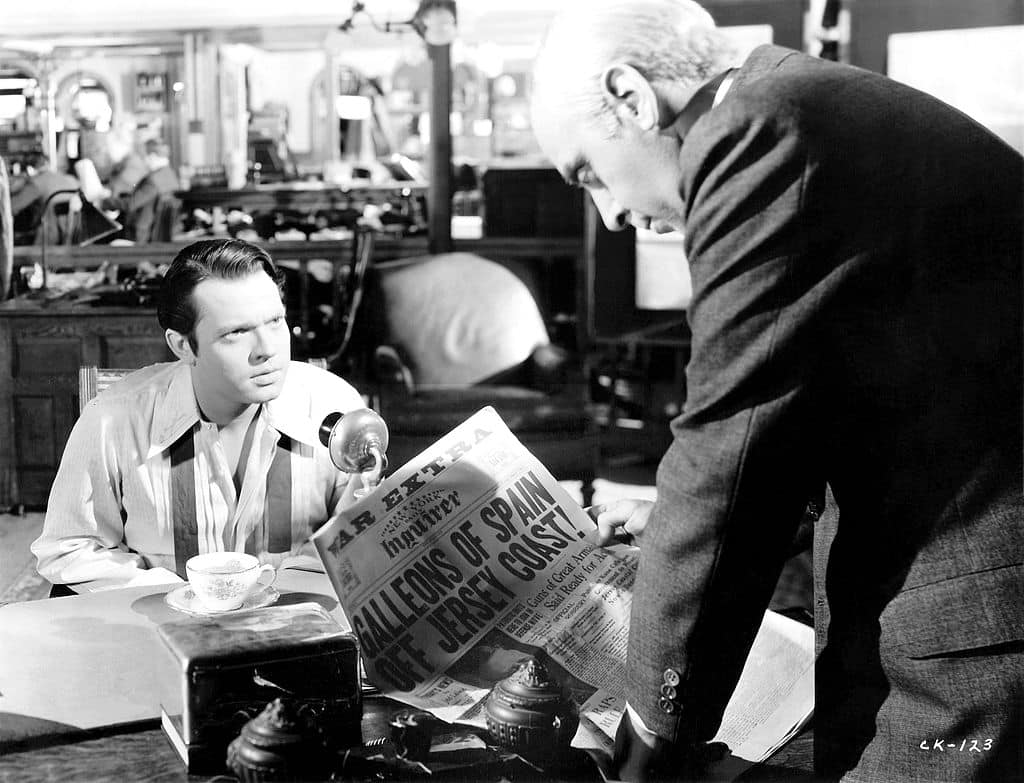Citizen Kane
Released in 1941 by Mercury Productions, Citizen Kane was the debut film for Orson Welles. At just twenty five years old Welles produced, co-wrote and directed the film, as well as playing in the starring role.
The plot examines the life and legacy of wealthy newspaper publisher and industrial magnate Charles Foster Kane. Told in flashback from the point of Kane’s death, Citizen Kane is considered groundbreaking in both story arc and camera technique.
In creating the main character, it was rumoured that Welles and his co-writer Herman J. Mankiewicz took inspiration from real life media figures William Randolph Hearst and Joseph Pullitzer, along with Chicago based business tycoons Samuel Insull and Harold McCormick. Randolph Hearst was so angered by the association that he reportedly banned any mention of the film in his newspapers, and publicly denounced Orson Welles as a Communist, a potentially career damaging accusation at the time.
Kind Hearts and Coronets
This dark but excellent comedy features a dazzling cast of British actors including Alec Guinness and Dennis Price. Probably most recognised as the film in which Alec Guinness plays no less than nine different characters, Kind Hearts and Coronets was released in 1949 by Ealing Studios, just one of a series of films now known collectively as the Ealing Comedies.
Vaguely based on the 1907 novel Rank: The Autobiography of a Criminal, the story rolls out in typical Ealing style. A young man sets about befriending and then murdering his distant relatives in order to claim his place as Duke of Chalfont, taking revenge for his disinheritance in the process. A dry, witty and cynical comedy ensues, but will Louis D’Ascoyne Mazzini get what he deserves?
The Great Dictator
Released in 1940 before the true horrors of German war camps were understood, The Great Dictator is the first true sound film for silent film star Charlie Chaplin. In fact he not only plays in the two leading roles, Chaplin also wrote, directed, produced and scored this hugely popular film.
A mix of physical comedy and sharp political satire, The Great Dictator was a commercial hit in the box office and probably Chaplin’s most successful film.
The story begins as an anonymous Jewish private saves the life of a wounded pilot but suffers amnesia in the process. After the war, the private returns to his old life as a barber in a ghetto now ruled by the ruthless dictator Adenoid Hynkel.
As the film comes to a close the anonymous barber is mistaken for the great dictator Hynkel and takes his place in front of assembled supporters of the regime. Here he takes his opportunity to denounce everything the dictator stands for in a rousing call for democracy, in what is seen as one of the most moving and memorable scenes in film history.
Fantasia
Designed as a comeback role for Mickey Mouse, Fantasia started life as an animated short for Walt Disney Productions. As production costs grew the short was included in a feature length film alongside seven other animated segments, each set to classical music performed by the Philadelphia Orchestra. This resulted in a unique and astonishing combination of wild animation, classical music and pioneering stereophonic sound.
Released in a small number of cinemas across America to critical acclaim, British audiences missed out when the European market was cut off due to World War Two. Various edited, enhanced and restored versions have been released since, and children all over the world finally have the opportunity to laugh at the misfortune of the sorcerer’s apprentice who can’t keep control of his broom.
The Big Sleep
Based on the popular Raymond Chandler novel by the same name, this 1946 film noir features a twenty one year old Lauren Bacall alongside then movie veteran Humphrey Bogart.
The Big Sleep followed Bacall’s debut in To Have and Have Not, and though it received mixed views from the critics it remains a popular film among fans of the era. Initially completed in January 1945, release was delayed in favour of completed war theme films. By the time of its release a number of extra scenes had been added, leading to criticisms that the plot can sometimes feel confusing for the audience.
The title of the film refers to a gangster euphemism for death. Private detective Philip Marlowe is called to the mansion of a General Sternwood and finds himself tangled up in the world of gambling, blackmail, murder and organised crime. Lauren Bacall stars as Vivian, the oldest daughter of the Sternwood family who accompanies Marlowe in his search for the truth.
